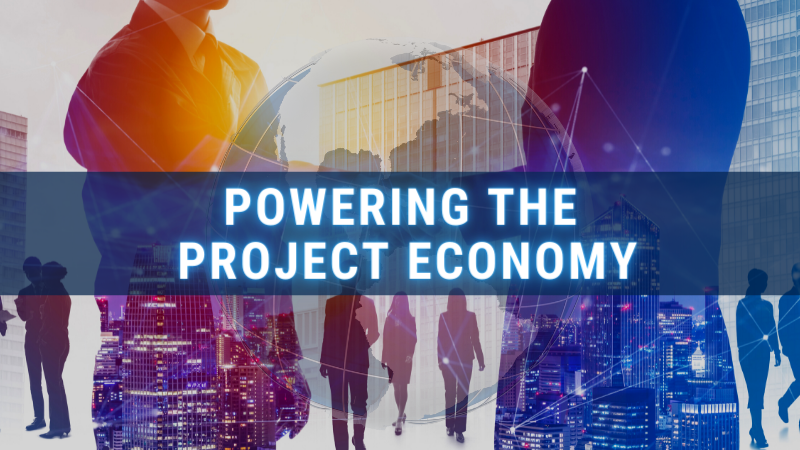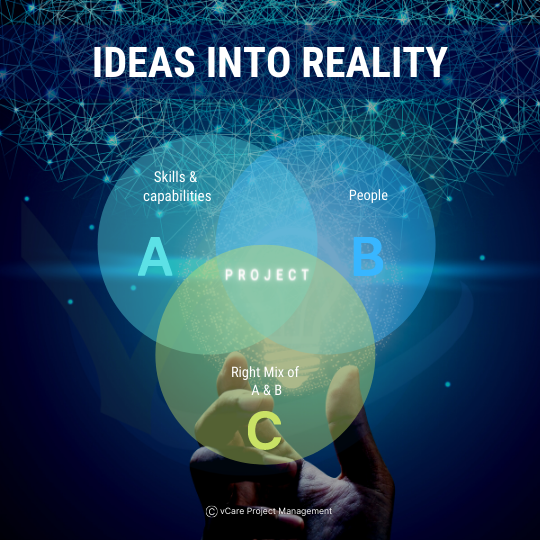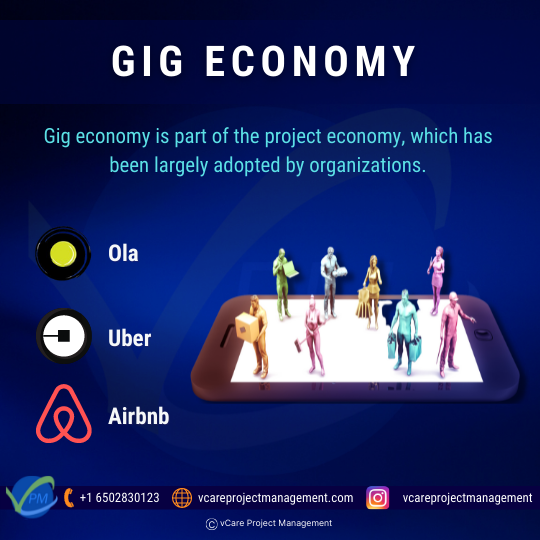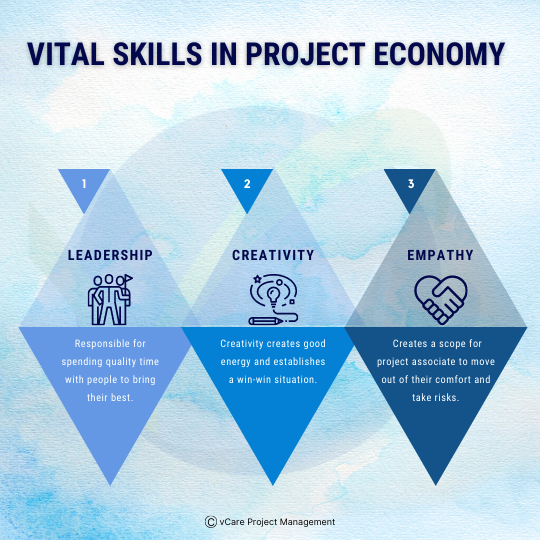
Powering The Project Economy – Project Economy – Part 5
Ideas into Reality
People have the skills to work on projects, but they need to be channelized across multiple projects. These skills are the ones that help in the success of the projects. In the end, the people’s skills and capabilities in the project serve to turn ideas into reality. That is when the project delivers value to its stakeholders. The people are the enablers for the growth and transformation of the projects. Ideas can be converted into reality by achieving the right mix of skills and capabilities in people.

Ideas into Reality
The Project Economy at Work
The skills are utilized in project-based structures included in large organization’s portfolios and programs.
According to Professor and author Roger Martin, one of the world’s top-ranked management thinkers, this kind of approach is called “projectization,” where the everyday tasks become projects by themselves. Such trends are on the rise as “Gig Economy” is part of the project economy, which has been largely adopted by organizations like Ola, Uber, Airbnb, etc.,
People with varied skills, experience, and capabilities are brought onto one project to deliver value to the stakeholders. The resources are aligned at the portfolio level and mobilized to the projects on-demand based on priorities. Such an approach minimizes the cost of hiring, training, and retention. They all evolve into a high-performing workforce as they started merging into the socio-cultural aspects of the portfolio capabilities.

GIG ECONOMY
For example, companies like Zappos adopt a culture wherein the onboarded people or hired people are put onto their call centers to understand the various departments involved in the process and understand the pain they undergo. Post that, they will be able to get the context and core values of the organization, which were they can synchronize. It’s all about the task at hand than the title itself.
Vital skills in Project Economy
The Project Economy needs uniquely human skills such as leadership, creativity, and empathy.

Vital skills in Project Economy
Leadership – Need to bring in the best of human potential. When the project economy is adopted, the people will move from role-based work to project-based work. As projects are going complex, a project manager is responsible for spending quality time with the people to bring their best.
Creativity – Creativity helps to find solutions to the problem in novel ways. Co-creation along with the stakeholders would minimize the postponement of decisions. It also extracts the thinking power of the participants creating new options. Creativity also creates good energy and establishes a win-win situation. Creativity can be fostered by providing an appropriate space to the team, decluttering the workplace, adopting a design thinking approach, etc… Foster an environment where creativity is recognized and rewarded
Empathy– When the project manager applies empathy, it creates scope for project associates to move out of their comfort zone and takes risks. It also brings on agility and helps reduces stress through minimized conflict. With empathy kindness and compassion becomes the natural ingredient promoting teamwork and leadership among individuals. Empathy can be exhibited by the project manager who is willing to be vulnerable and has the mindset to listen to all and exhibit leadership by walking the talk.
Project Economy Adoption
In the Middle East
There are many infrastructure projects already underway in the Middle East, such as Smart City, Higher Education, expansion of health care, etc… These projects bring changes to the digital infrastructure, transportation, and allied government service. Already in Dubai International Project Management Forum plays a vital role in megaprojects, including Construction of Digital Twin, Asset Project Management, BIM Implementation for Roads and Transportation Authority, Solar Park. All of these projects need people to execute. People are needed with the right skills to provide value to the stakeholders.
In the European Union
Case Study-1: Municipality located in Southern part of Sweden with more than 32000 inhabitants having organization size of 2400 full time and permanent employees have been organized as seven administrative departments. EU-funded projects were executed, and the projectification of departments, including public health, was achieved.
- The municipality has educated themselves and other organizations surrounding them, which helped effectively manage the EU funds and create competent project organization where employees make sense of their work.
- This move is transforming the civil servants, politicians to handle project activities affecting their organizing the style and overall impact on their performance routine.
- Implies changes where routines, or day-to-day activities, to an increasing extent are organized and understood, as if they were projects.
Case Study-2: Totally program worth 67.9 billion was allocated for the operational program through the EU. Territorial Self Government Units covering 57 offices were involved in a Survey related to identifying the benefits of Projectification
- Labor market institutions, up to 100% of offices declared that projects are never abandoned in the course of their lifetime
- In 96% of the projects, there was no change in the planned budget
- 89% of projects were completed according to the original schedule
- In 96% of the projects, there was no change in the planned budget
- Public organizations acting in this way make use of opportunities that arise in their environment, which proves their flexibility in adapting to changing conditions
- Changes in organizational structure are a temporary adaptation to the changes that have occurred in the external environment
Case Study-3: Automotive, Manufacturing, Engineering-Procurement-Construction (EPC), 2006 Football World Cup, Establishment of the Tsunami Early Warning System in South-East Asia.
- GPM study on projectification in Germany, almost 50% of working time in the manufacturing industry is spent on project work (GPM 2015)
- The project economy will generate 15% of value-added in Germany in 2020 (in 2007, it was 2%).
- The mean value shows that around 37% of all work processes in corporations are now organized in a project-oriented manner.
Summary:
As priorities change in these difficult times rapidly, project organizations need to embrace change. The Project Management office needs to build a team that commits to success. Project economy adoption is already a reality in various regions of the world. There are proven cases wherein successful projects are delivering values. Let’s focus on turning ideas into reality.
Feel free to check out my discussion on this topic with Dr. Reinhard Wagner in YouTube
You can subscribe and follow my podcasts and interviews with Project Management Experts on YouTube at https://bit.ly/2NDY8wd
You can subscribe to vCare Project Management YouTube Channel to catch future videos of our certification Q&A series and student success stories using the link https://bit.ly/2YF0wJl
For any questions related to Project Management career, training, and certifications, you can book an obligation free 15 minutes session with me by visiting talktodharam.com


Recent Comments